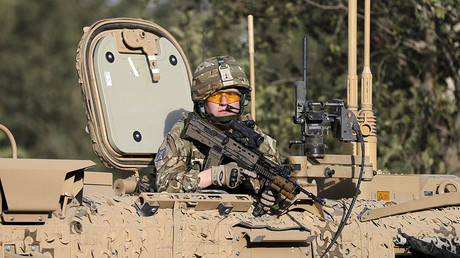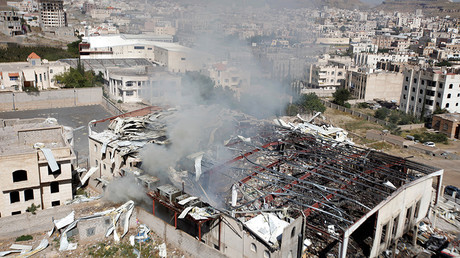British collusion with sectarian violence: Britain, Saudi Arabia & Afghanistan (Part 3)
Dan Glazebrook is a freelance political writer who has written for RT, Cunterpunch, Z magazine, the Morning Star, the Guardian, the New Statesman, the Independent and Middle East Eye, amongst others. His first book “Divide and Ruin: The West’s Imperial Strategy in an Age of Crisis” was published by Liberation Media in October 2013. It featured a collection of articles written from 2009 onwards examining the links between economic collapse, the rise of the BRICS, war on Libya and Syria and 'austerity'. He is currently researching a book on US-British use of sectarian death squads against independent states and movements from Northern Ireland and Central America in the 1970s and 80s to the Middle East and Africa today.

The oppressive, sectarian and violent nature of the Saudi state and its foreign policy is increasingly coming under the spotlight, even in mainstream Western media.
Yet the reality is not, as it is so often portrayed, that 'civilized' Britain is somehow sullying itself by 'supporting' the Saudi rogues. On the contrary, the Saudis are merely implementing a barbaric policy made in the West.
From Syria to Yemen, wherever there is bloodshed and massacre in the Middle East, Saudi money and guns are never far away. But behind the Saudis lies Anglo-American power. The deal today - as it has been for over a hundred years - is that, in exchange for a Western guarantee of their own security, the Al Sauds effectively cede control of their country's foreign policy to the West. And the architect of that deal was the British state.
Before their alliance with the British, the Al Sauds were little more than murderous bandits, with little chance of achieving lasting power over any significant portion of the Arab peninsula.
Said Aburish, the biographer of the House of Saud, notes that whilst most Arabian tribes were settling or farming, Ibn Saud "was in the business of raiding other tribes to steal their camels, sheep and grain" - after which he typically "murdered all the men of the raided tribe to prevent future retaliation".
As a result, the Al Sauds were reviled by most Arabs and Muslims, their leadership not even totally accepted amongst their own tribe, the Ennezza. This hostility between the Al Sauds and the other Arabs was deepened by their adherence to a particularly sectarian interpretation of Islam, Wahhabi'ism, which rejects as apostates pretty much every Muslim who does not subscribe to their medievalist philosophy.
Yet it was precisely this divisive quality which appealed to British imperialism. The British empire of the nineteenth century - guided by the philosophy of 'divide and rule' - was always on the lookout for groups lacking 'native' support to back, as they would be eternally dependent on British support and therefore could be reliably trusted to act as imperial agents. Furthermore, such groups would be utterly incapable of uniting their people into any kind of independent polity - always Britain's worst fear within its colonial dominions.
From Syria to Yemen, wherever there is bloodshed and massacre in the Middle East, Saudi money and guns are never far away. But behind the Saudis lies Anglo-American power.
According to the leading historian of the developing Saudi-British relations in this period, Jacob Goldberg, the British elevated Ibn Saud above “people who were religiously, politically and strategically more important”. But this was, of course, the point. For the British, his relative unimportance was his greatest asset, for it left him utterly dependent on the British. Unlike his rivals, such as the Hashemites, he had no other source of power or authority beyond his alliance of convenience with the (Wahabbi'ist) Ikhwan fighters.
Thus, two years after Ibn Saud and his followers conquered Riyadh in 1902 - burning to death 1,200 of its inhabitants, and enslaving many of its women as trophies of their victory - the British began paying a stipend to Ibn Saud. The payment was greatly increased in 1911, with Ibn Saud using the money, says Aburish, to "expand and subsidize the loss-making colonies of soldier-saints of the Ikhwan, or ‘brothers’. [These] were fanatics of the Wahhabi sect to which Ibn Saud belonged, who were to provide the backbone of his conquering forces and whose savagery wreaked havoc across Arabia."
Aburish noted that, "traditionally committed to individual freedom and achievement, the rest of the Muslims found the idea of the colonies and the fanaticism they produced totally unacceptable”.
Over the next few years - with British aid, arms and advisers - Ibn Saud and his warriors were able to defeat the rival Ibn Rasheeds and capture the Eastern Province of what is now Saudi Arabia. In 1915, Ibn Saud signed a treaty with the British which “elevated him to the role of a British-sponsored ruler of central and eastern Arabia”.
They knighted him the same year.
Ibn Saud's conquests continued (although, as Aburish put it, “his conquests were no more than raids which, through British support, acquired a permanent nature”), and in 1925 his forces captured the Hijaz, where “as had been feared, Ibn Saud’s Ikhwan followers killed hundreds of males, including children, ransacked an untold number of houses, murdered non-Wahhabi religious leaders who opposed their brutal ways and destroyed whole towns".
The region's highly developed legal system was scrapped, and its institutions of representative government - complete with senate, cabinet, and party pluralism - were all abolished.
Instead, Ibn Saud appointed a council of advisers headed by the British Resident Harry St John Philby - and without a single native Saudi. The "feeling" noted by Sir Arthur Hirtel of the British India Office a year earlier - “that it would be good if Ibn Saud established himself in Mecca” - appeared to have been vindicated.
Two years later he had signed a new "friendship and cooperation treaty" with the British which ceded all control of external affairs to them. And he was clearly the right man for implementing 'divide and rule', creating border disputes with every one of his neighbors during the 1920s, including Iraq, Jordan, Qatar, Kuwait, Oman, the Yemen and the Trucial states (today’s UAE).
The depth of Ibn Saud's loyalty to his imperial masters - and the shallowness of his religiosity - was subsequently revealed when in 1929 he turned on his Ikhwan enforcers. They had wanted to expand into Iraq and Kuwait (as their evangelism demanded), but Ibn Saud knew this would be frowned on by the British.
So, with British support, he attacked their base in the village of Sabila and massacred them. If the Ikhwan had been his SA, this was his 'Night of the Long Knives'. As Aburish put it, “Ibn Saud set his relationship with his sponsors above his connection with religious zealots for whom he no longer had any use”. By this time, Ibn Saud's British stipend had reached £60,000 per year - equivalent to thwo-thirds of the country's national income. Three years later, the Kingdom of Saudi Arabia - the only country in the world to be named after its ruling family - was officially founded.
As Aburish has concluded: “The simple, undeniable fact behind Ibn Saud’s rise to power was Britain’s interest in finding someone to deputize for it on the eve of the First World War… Ibn Saud, homeless and hungry, was there for the asking, cheap and willing to accommodate any sponsor".
Indeed, Ibn Saud conceived of himself as an agent of the British from the very beginning. Like others before, he sought the sponsorship and protection of an imperial power, any imperial power, and following his rejection by the Ottomans, wrote this to the British resident in the Gulf: “May the eyes of the British government be fixed upon us and may we be considered as your proteges”.
Says Aburish, "Rather than acting as a unifier of the Arabs, Ibn Saud afforded an outside power, Britain, the comfort of keeping the Arabs and Muslims divided and protected its commercial and political interests, which opposed an Arab unifier at the helm."
In the process, it is estimated that Britain's protege had publicly executed 40,000 people and had the limbs amputated from another 350,000 during his campaign to subdue the peninsula - that is a total of 8 percent of the population either killed or mutilated in order to realize Britain's desire that sectarian division should reign.
But for Britain - as, later, for the US - the choice of Ibn Saud as its Middle Eastern deputy has been a shrewd one, with the Saudis being the faithful enforcers of imperial skullduggery ever since.
From the very start, for example, the Saudis have been more than happy to throw the Palestinians under a bus to please the British. Throughout the 1930s, Ibn Saud ignored King Ghazi of Iraq's call for a common Arab front against the colonization of Palestine, and then in 1936, when a 183 day Palestinian national strike was itself putting the British government under serious pressure, Ibn Saud persuaded the Palestinian Mufti to call the strike off, promising he would intercede with the British on the Palestinians' behalf. British Foreign Office documents, however, show no record of this 'intercession' ever having taken place.
Three years later, in exchange for a £20 million payment, Ibn Saud accepted Britain's proposal for a Jewish state on colonized Arab land. During the Arab-Israeli war of 1948, Saudi Arabia not only refused to send forces to Palestine, but even tried to prevent fighters from traveling there voluntarily, and ordered its newspapers to tone down their reporting of Palestinian suffering.
Today, of course, whilst publicly opposing Israel, the Saudis are perfectly willing to host the enormous Dhahran airbase of Israeli's biggest military supplier and ally, the US.
In the 1980s, the Saudis encouraged (and financed) the Iraqi attack on Iran, and then kept oil prices low in order to maximize the war's destructive effect on both countries. When the Iraqis wanted to sue for peace in the mid-1980s, they asked the Saudis to restrict production in order to prod outside powers into bringing the war to an end. Of course, the Saudis refused.
Saddam Hussein's adviser Sa’ad Al Bassas commented later that “We knew they wanted the war to continue, but we were too dependent on them for financial support to complain out loud. They were following an American policy which called for weakening both countries”. In fact, this was precisely the British policy formulated in 1915, which called for a "weak and divided" Arabia.
In recent decades, the Saudi state has developed an additional niche role in the implementation of Anglo-American imperialism. As revolutionary liberation movements began to threaten the West's dominion over the third world, especially from the 1970s and 80s onwards, Saudi Arabia became the bankroller and conduit for covert, often illegal, Western policies to terrorize such movements and governments into submission. From the contras in Nicaragua, to the UNITA rebels in Angola, to the fascist Phalangists of Lebanon, to the apartheid regime in South Africa, CIA-backed sectarian terror outfits the world over became the recipients of Saudi largesse. But it was in Afghanistan where this policy reached its apogee.
The Afghan revolution of 1978 brought the socialist PDPA movement to power. The new government immediately implemented a series of popular reforms including land reform and the constitutional recognition of women's rights for the first time. The US and Britain saw such a movement as a threat to their control and exploitation of the third world, and especially feared its alliance with the Soviet bloc as undermining their global hegemony.
Beginning in mid-1979, the CIA began providing weapons to ultra right wing terror groups, who used Islam to justify attacks on the new government, its supporters, and its social infrastructure, including an assassination campaign which killed hundreds of teachers and civil servants. This support was designed, admitted Jimmy Carter's adviser Zbigniew Brzezinski in 1996, not only to undermine the new government, but also to draw in the Soviet Union and bog them down in a demoralizing and costly conflict - that is, as he put it, to "give the USSR its Vietnam war".
The US and Britain saw such a movement as a threat to their control and exploitation of the third world, and especially feared its alliance with the Soviet bloc as undermining their global hegemony.
The strategy worked. By 1980, the Soviet Union had sent troops to support the embattled Afghan government, but as the years went by - and US, British and Saudi support to the 'rebels' was stepped up - the Soviets were eventually unable to sustain the massive cost in both lives and wealth, and withdrew in 1989.
In just one three-year period during this time - from 1987 to 1989 - Saudi Arabia had provided $1.8 billion in financial support to the anti-government fighters in Afghanistan (around twice the amount it had given to the PLO in the previous 14 years), as well as providing thousands of fighters.
But what is intriguing is that this support was not, as is traditionally believed, premised on religious ideology, but was rather driven, once again, by fidelity to the Saudis' imperial masters. In "Jihad in Saudi Arabia", Thomas Hegghammer notes that this financial and military support “Clearly... was not an automatic response to the Soviet invasion, because Arabs had not volunteered for other conflict zones in the past and did not to Afghanistan in significant numbers until the mid-to late 1980s”.
Indeed, says Hegghammer, there were only 16 Saudi fighters in Afghanistan before 1985, whilst “the permanent Saudi contingent would not exceed 50 people until early 1987”. In fact, initial Saudi support for the insurgency was primarily diplomatic, political and humanitarian, rather than military. Indeed, it was only at the request of the US that the Saudis agreed, in 1981, to match US funding for the militia groups themselves - and it was therefore only when the US ramped up financial support to such groups - the so-called 'mujahedin' in the mid-1980s that the Saudis were obliged to do the same.
Furthermore, says Hegghammer, the main opposition to the encouragement of young men to fight in Afghanistan came precisely from the "religious establishment": "A common misperception in the historiography of the period is to present the Wahhabi religious scholars as prime movers behind the mobilization to Afghanistan. In fact very few, if any, of the scholars in the religious establishment actively promoted the Afghan jihad as an individual duty for Saudis”.
Saudi support for the mujahedin, just like Ibn Saud's violence 60 years earlier, was driven not by religious idealism, but by an undying commitment to facilitating Western foreign policy - regardless of the cost in human lives. The ongoing consequences of this Afghan policy - the creation of the worldwide Al Qaeda terror network and offshoots such as ISIS - are well known. But, as Brzezinski put it: who cares about "some stirred-up Muslims" when the policy helped bring about the destruction of the Soviet Union?
Hegghammer summed up the various parties involved thus: “In Afghanistan…volunteerism [that is, the insertion of foreign fighters] was sanctioned by the USA, welcomed by the Afghans [fighting the government] and facilitated by the presence of a transit territory, namely Pakistan".
This formula – the foreign fighters, financed by Saudi Arabia, and infiltrated through the willing collaboration of Pakistan – is precisely the one which has been used against Syria in recent years, with Turkey in the Pakistani role. Thus does the British-created Saudi state continue to fulfill the imperial role assigned to it over 100 years ago.
As Aburish put it, “Britain created Ibn Saud to protect its Middle East imperial interests and to eliminate those who threatened them... Without the West there would be no House of Saud. The Saudi people or their neighbors or a combination of both would bring about its end”.
Remember that next time a Boris Johnson or a Joe Biden feigns innocence about the role of the 'dastardly' Saudis. Everything they do, Boris, they do it for you.
The statements, views and opinions expressed in this column are solely those of the author and do not necessarily represent those of RT.






0 Comments:
Post a Comment
Subscribe to Post Comments [Atom]
<< Home